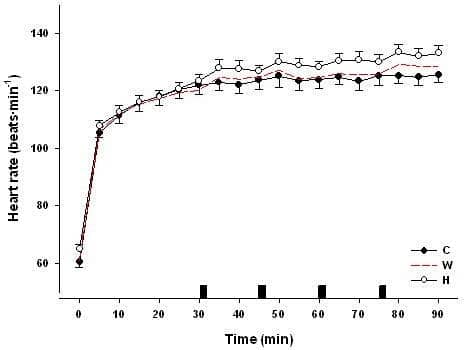The effects of the temperature of ingested beverages on physiological responses during exercise have not been extensively studied. This study aimed to investigate the influence of beverage temperature on thermoregulatory responses during prolonged cycling exercise. With ethics committee approval, 8 non-heat-acclimatised men exercised on a cycle ergometer on 3 occasions at 50 ± 3% (Mean ± SD) of their VO2peak for 90 min in an ambient temperature of 25.3 ± 0.5°C with relative humidity of 60 ± 5%. A beverage volume of 400 ml at temperatures of 10 (C), 37 (W) or 50°C (H) was ingested within 2 min after 30, 45, 60 and 75 min of exercise. Immediately following exercise, subjects cycled at 95% peak to exhaustion. Rectal temperature (Tre) and weighted mean skin temperature (Tsk; Ramanathan 1964), from which total body heat content (TBHC) was derived, and heart rate (HR) were recorded at rest and during exercise. Expired air was collected to estimate substrate oxidation and metabolic heat production. Statistical differences between variables were assessed using ANOVA. No significant differences were found in any variable prior to the ingestion of drinks. Therefore the 30th min of exercise was used as the baseline throughout. The absolute rise in Tre at the end of exercise was 0.42 ± 0.20, 0.30 ± 0.22 and 0.46 ± 0.22?C for the C, W and H trials respectively (p=0.342). Mean Tsk appeared to be influenced by beverage temperature (34.49 ± 0.64, 34.53 ± 0.69 and 34.71 ± 0.48°C for trials C, W and H trials respectively; p=0.09). Significant differences in mean HR were observed (124 ± 9, 126 ± 8 and 129 ± 7 beats.min-1 for the C, W and H trials respectively; p<0.05; Figure 1). Endurance capacity was not different between trials (205 ± 88, 213 ± 74 and 215 ± 85 s for C, W and H trials respectively; p=0.963). Total body heat content increased by 314 ± 15, 289 ± 16 and 314 ± 17 kJ in trials C, W and H respectively. There was no difference in ΔTBHC between the C and H trials evaluated relative to trial W whereas the calculated difference in the heat required to warm/cool the respective beverages to body temperature amounted to 268kJ. Therefore, the heat load/debt induced at 15 min intervals resulted in appropriate thermoregulatory reflexes during exercise, resulting in similar body temperatures and TBHC, as opposed to the body merely acting as a heat sink.
King's College London (2005) J Physiol 565P, PC13
Communications: The influence of serial feeding of beverages at different temperatures on thermoregulatory responses during prolonged exercise in man
Lee, Jason KW; Shirreffs, Susan M; Maughan, Ronald J;
1. School of Sport & Exercise Sciences, Loughborough University, Loughborough, United Kingdom.
View other abstracts by:
Figure 1.Heart rate (beats/min) during the 3 experimental trials. Mean values and S.E. are shown. Shaded blocks denote the ingestion of beverage.
Where applicable, experiments conform with Society ethical requirements.

